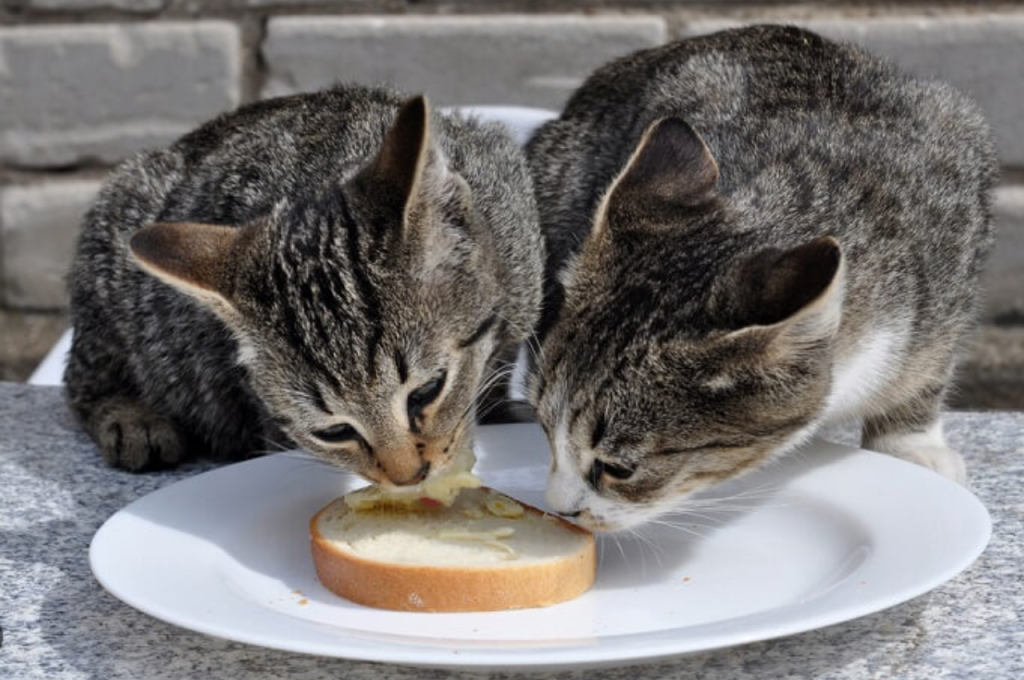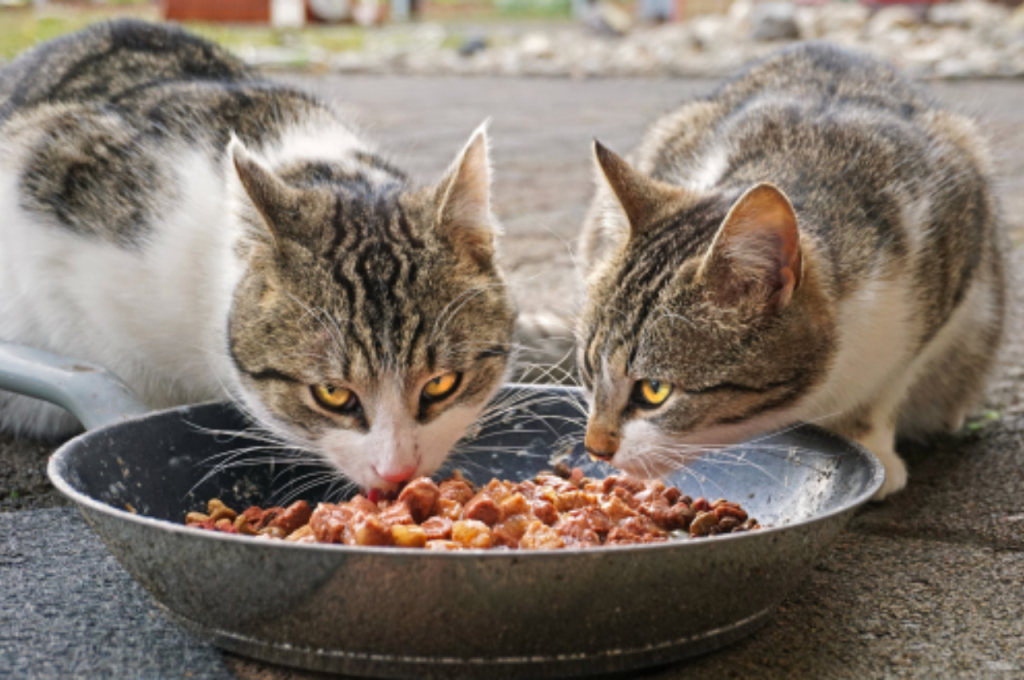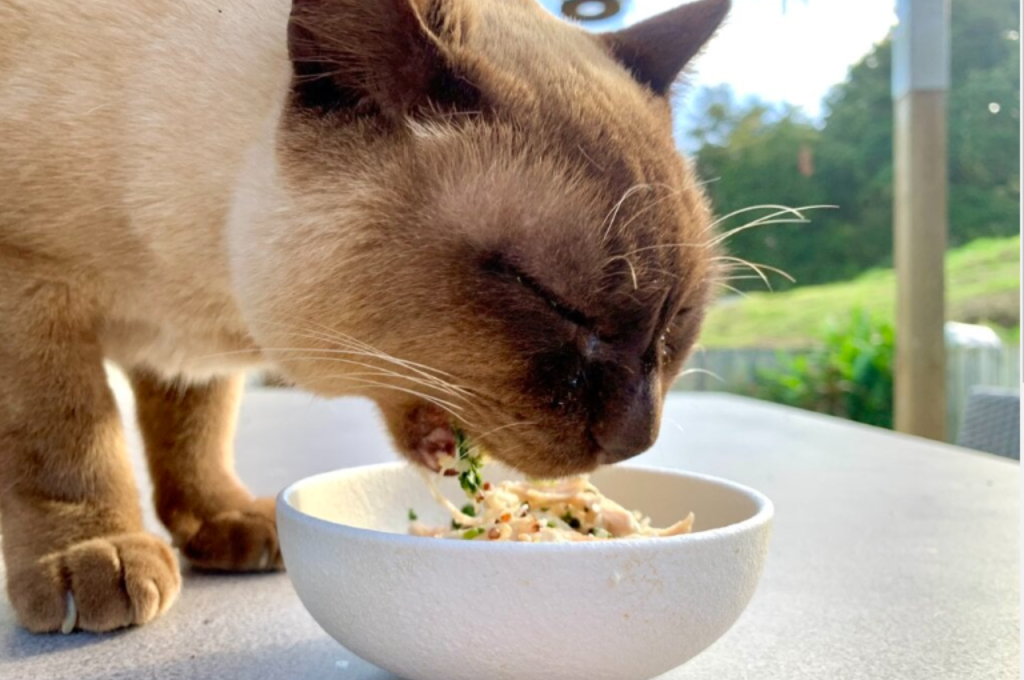Yes, cats can eat bread in moderation, but it should not be a regular part of their diet. Bread is not essential for a cat’s nutrition and can lead to weight gain and digestive issues if consumed in excess.
While cats are obligate carnivores and derive most of their nutrition from meat, they can occasionally eat small amounts of plain, unsalted bread without experiencing any major health issues. However, bread lacks essential nutrients that cats need, and too much consumption can lead to obesity and gastrointestinal upset.
Additionally, some cats may have sensitivity or allergies to gluten found in bread, leading to adverse reactions. It’s important to prioritize a balanced and species-appropriate diet for your feline companion, with a focus on high-quality cat food and treats specifically formulated for their unique nutritional needs.
The Anatomy of Cats and Their Dietary Needs
Understanding the dietary needs of cats is crucial for their overall health and well-being. Cats have a unique anatomy and digestive system that shapes their dietary requirements. In this article, we delve into the anatomy of cats and explore their natural diet, shedding light on whether bread can be a part of their nutrition.

Cats’ Digestive System
Cats have a relatively short digestive tract, designed for the consumption of animal-based protein. Their digestive enzymes are adept at breaking down meat and extracting nutrients from it. Unlike humans, cats lack the necessary enzymes to efficiently digest carbohydrates, which plays a vital role in their dietary needs.
Natural Diet of Cats
In the wild, cats are obligate carnivores, meaning their diet primarily consists of meat. Their natural diet includes a high percentage of protein and moderate fats, with very minimal carbohydrates. This evolutionary dietary preference has shaped the anatomy and digestive system of cats, making them more suited for a carnivorous diet.
Bread and Cats: Is it Safe?
Cats and bread, a safe mix? Learn whether it’s safe for cats to eat bread and what precautions to take.
Nutritional Value of Bread
Cats don’t need bread for their diet. Bread is low in vital nutrients for cats. Bread lacks essential vitamins and minerals. Cat food is a more balanced option.
Effects of Bread on Cats
Cats can eat bread in moderation. Bread can cause digestive issues. Gluten in bread may lead to allergies. Cats can become overweight by excess bread. In summary, cats can have bread occasionally, but it’s not a necessary part of their diet.
Risks and Potential Health Issues
While bread may seem harmless to humans, it is essential to consider the risks and potential health issues that can arise when cats consume it. While cats are obligate carnivores and their diet should primarily consist of meat, it is not uncommon for them to show an interest in bread. As a responsible cat owner, it is crucial to understand the hazards associated with cats eating bread and take necessary precautions to ensure their well-being.
Possible Allergic Reactions
Just like humans, cats can develop food allergies, and bread is no exception. Wheat, which is a key ingredient in most bread products, contains gluten, a protein that some cats may be allergic to. When a cat consumes bread, they may experience various allergic reactions, such as:
- Vomiting
- Diarrhea
- Itchy or inflamed skin
- Excessive scratching
- Sneezing
- Watery eyes
If you notice any of these symptoms after your cat has consumed bread, it is crucial to consult a veterinarian as soon as possible. They can diagnose the allergy and recommend suitable treatment options to alleviate your cat’s discomfort.
Digestive Problems
Cats have a delicate digestive system that is not designed to handle certain ingredients found in bread. Some potential digestive problems that can arise from cats eating bread include:
- Upset stomach
- Abdominal pain
- Constipation or diarrhea
- Intestinal blockage
- Excessive gas
These issues can cause significant discomfort and potentially lead to more severe complications requiring immediate veterinary attention. The high carbohydrate content in bread can disrupt a cat’s natural digestive balance, leading to gastrointestinal distress.
Therefore, it is best to avoid allowing your cat to consume bread as a preventative measure to protect their digestive health.
Feline Nutrition: What Cats Need in Their Diet
Cats have specific dietary needs, but bread isn’t an ideal choice. While cats can eat small amounts of bread, it lacks the necessary nutrients and can lead to digestive issues. A balanced cat diet should consist primarily of animal-based proteins.
Essential Nutrients for Cats
Cats, like humans, require a balanced diet to stay healthy and thrive. When it comes to feline nutrition, it’s important to understand the essential nutrients that cats need in their diet. These nutrients play a vital role in their overall well-being and support their growth, energy, and immune function. A complete and balanced feline diet should include the following essential nutrients:

– Protein: Cats are obligate carnivores, meaning they rely on animal protein for optimal health. A diet rich in high-quality protein is essential for muscle development, repair, and maintenance.
– Fats: Healthy fats are a crucial component of a cat’s diet. They provide energy, aid in the absorption of fat-soluble vitamins, and contribute to healthy skin and coat.
– Carbohydrates: While cats do not require a significant amount of carbohydrates, they can still benefit from a small portion of their diet for energy. It’s important to choose carbohydrates that are easily digestible for cats, such as rice or sweet potatoes.
– Vitamins: Vitamins are necessary for cats to maintain overall health and support their various bodily functions. They play a crucial role in metabolism, immune function, and bone health.
– Minerals: Cats require certain minerals like calcium, phosphorus, and potassium for proper growth, bone development, and nerve function. These minerals should be provided in the right balance to prevent deficiencies or imbalances.
Balanced Diet for Cats
To ensure that your feline friend receives a balanced diet, it’s essential to feed them a combination of high-quality commercial cat food and occasional treats. Commercial cat foods are specifically formulated to meet a cat’s nutritional needs, providing the right balance of proteins, fats, carbohydrates, vitamins, and minerals. When selecting a cat food, look for options that list animal-based proteins, such as chicken or fish, as the main ingredients. Avoid foods with excessive fillers and artificial additives as they provide little nutritional value. It’s also important to choose age-appropriate formulas, as the nutrient requirements of kittens, adult cats, and senior cats vary. While some human foods can be safe for cats to consume in moderation, certain foods are toxic to cats, such as bread dough, onions, garlic, and chocolate. It’s crucial to avoid feeding these foods to your feline companion as they can cause severe health issues.
Remember, a balanced diet is vital for your cat’s overall health and well-being. Consult with your veterinarian to determine the best diet plan for your furry friend and ensure they are getting all the necessary nutrients for optimal health.
Alternatives to Bread for Cats
When it comes to feeding your feline friend, it’s essential to consider alternatives to bread. Cats can eat bread in moderation, but it lacks the essential nutrients they need. Let’s explore some healthier options for your cat’s snacks.
Feline-friendly Snack Options
Cats enjoy a variety of treats that are both tasty and nutritious. Here are some options to consider:
- Lean proteins like cooked chicken or fish
- Small amounts of cheese or yogurt
- Fruits such as bananas or blueberries
Homemade Cat Treats
If you prefer making treats at home, try these simple recipes:
- Salmon treats: Bake salmon until cooked through, then cut into small pieces.
- Tuna balls: Mix canned tuna with a bit of flour and bake into bite-sized balls.
Observing Your Cat’s Behaviour and Health
As a pet owner, it’s important to monitor your cat’s behavior and health. When it comes to their diet, it’s essential to know which foods are safe for them. While cats can eat small amounts of bread occasionally, it’s not a suitable part of their regular diet and may lead to digestive issues.
Observing your cat’s behavior and health cats are mysterious creatures, often keeping their health and well-being a secret. But as a responsible pet owner, it’s crucial to keep a close eye on your feline friend’s behavior and physical condition when introducing new foods like bread into their diet. Signs of digestive upset look for signs of digestive upset such as vomiting, diarrhea, or constipation. These can indicate that bread may not agree with your cat’s stomach. It’s essential to monitor any change in litter box habits or any discomfort your cat may be displaying after consuming bread. If your cat exhibits these symptoms, consider eliminating bread from their diet and consulting a veterinarian. Physical indications of a balanced diet a balanced diet will often reflect in your cat’s physical appearance. If your cat’s coat is shiny and soft and they have healthy skin, it could be a sign that their diet is meeting their nutritional needs.
Similarly, strong, healthy teeth and well-maintained weight are indicators of a balanced and fulfilling diet for your feline friend. Pay attention to these physical cues to ensure that bread or any other new food is not causing negative effects on your cat’s well-being. By paying close attention to your cat’s behavior and physical condition, you can make well-informed decisions about their diet, ensuring they lead a healthy and happy life.
Consulting A Veterinarian
If you have any concerns about your cat’s diet or health, it’s essential to consult with a veterinarian. Veterinarians are trained professionals who can provide expert guidance tailored to your cat’s specific needs. Here’s why consulting a veterinarian is crucial:
Professional Advice On Cat Nutrition
When it comes to determining whether cats can eat bread, it’s crucial to seek professional advice on cat nutrition. A veterinarian can provide valuable input on the dietary needs of your feline friend. They can offer personalized recommendations based on your cat’s specific health and nutritional requirements, helping to ensure that your pet maintains a well-balanced diet.
Addressing Dietary Concerns
- Potential Allergies: A veterinarian can address concerns related to potential allergies or sensitivities that your cat may have to bread or its ingredients.
- Nutritional Imbalance: They can also assess the risk of nutritional imbalance that may arise from the consumption of bread, as well as offer alternative dietary options to meet your cat’s nutritional needs.
- Weight Management: Additionally, a veterinarian can guide weight management and the potential impact of bread consumption on your cat’s overall health.
Final Verdict: Bread and Your Feline Friend
Wondering if cats can eat bread? While bread may not be toxic to cats, it lacks significant nutritional value for them. Feeding cats bread in moderation is generally okay, but it shouldn’t replace their balanced diet. Keep in mind that some cats may experience digestive issues after consuming bread.
Safest Approach to Feeding Bread to Cats
Understanding the balance and moderation required in providing animal-based foods is essential for maintaining optimal health in cats. While such foods can offer valuable nutrients and proteins vital for their well-being, overconsumption or an unbalanced diet can lead to health issues.
Considering Your Cat’s Well-being First
Sparingly, but it isn’t recommended as it lacks essential nutrients. If you choose to give your cat a small amount of bread, opt for plain, whole-grain bread without any harmful toppings. Avoid giving your cat bread with raisins, garlic, onion, or xylitol as these ingredients are toxic to felines. Feeding your cat a varied balanced diet tailored to their nutritional needs is vital for their health.

Remember, cats are obligate carnivores, meaning their diet should consist mainly of animal-based proteins. During mealtime, prioritize high-quality cat food over bread to ensure your cat gets the nutrients they need.
Conclusion
While cats can eat bread in moderation, it is not an essential part of their diet. Consider offering healthier snack options for your feline friend to maintain their overall well-being.
Remember, always consult with a veterinarian for specific dietary recommendations for your cat’s health and happiness.
